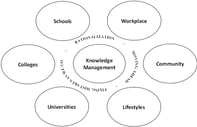Published on
Educational Business Models: Time For Change

I have for sometime now been pondering the current state of education and specifically education in the UK. I don’t just mean schools, colleges and universities and mean the whole system. I ask myself what is really wrong with it, why is everyone complaining about it being so awful? Is it inadequate leadership, is it poor teaching & learning, is it a lack of investment by government and or the private sector or is it something else? (A bit of everything maybe?).
The UK educational system is undergoing a major paradigm shift, with each nation (England, Scotland, Wales and Ireland) all going in different directions, creating in essence different standards of education and entitlements to that education, depending on where in the UK you live.
One method being explored, all though not made explicit by the UK government is the privatisation of the UK educational system, with the key stakeholder being the shareholders. Is it really possible for these shareholder driven organisations to really do a better job then the public sector?
One thing I am very sure about and that is in an education system which is owned and operated by the private sector, it will certainly be “lean”, it will have to be profitable and to survive it will have to have good to outstanding results; well that’s the theory until it goes wrong, and then has to be propped-up by the public sector, just like the ‘bankers’.
So what is the alternative? What is the next step in the evolution of education? Should it go back to when the “church” was a major player in education, moving back to ethical and moral standards in a framework of religious teaching? Or perhaps we should move to the grammar school model? To be honest I am not sure I have the answer, however, I do have the seed of an idea?
What if, what if the people who benefits from schooling owned and operated the educational establishments? And no I am not suggesting the students run the schools, colleges and universities, nor am I suggesting that employers’ run them.
What I am suggesting is a stakeholder partnership, a co-operative. Nothing new in this I hear you say. And yes you are correct it’s not new, and it does exist in different manifestations already, but not in a truly holist model and a model that could work in education or does it?
So what the model then, well it’s a stakeholder model, where all stakeholders and I mean all stakeholder have a stake in the establishment. So what I hear now is, this model can’t work how can it, it will education by committee. And yes it could be, but that depends on the organizational structure.
My proposal is this: Every stakeholder has to be a real partner in the organization. And I mean the children themselves, their parents, teachers, governors, employers and the senior management team, the government, they all have to be stakeholders/partners and they all have to make a contribution and I don’t mean a contribution in-kind, I mean a financial contribution proportionate to their income. Is this not just another form of shareholder, well yes, sort of but not quite? The concept needs work I admit, but it could work.
Preposterous I hear you shout, how can a 6 years old child contribute to its own education, well the same way many children contribute to their families now, by being part of it, by doing something of value, beyond learning. Simplistic maybe, but it is possible (And yes I know I said the contribution could not be in-kind, but it depends on the age of the child, does it not, it depends on the contextual setting).
Lets now look at teaching and learning. Many schools, colleges and universities suffer from inadequate teaching and learning, why else would we have the likes of Ofsted (UK). What if teacher had to make a financial contribution to their school, college or university? What if the teachers owned part of the school, with the children, and the parents? What if they were all partners? Would it make a difference?
What if the Principal and CEO of a college had to make a financial contribution to their college, and as a result owned part of it. Would they be driven to succeed? I am not talking about Management Buy Outs (MBOS). I am talking about partnerships, but real partnerships not just shareholders.
What if every stakeholder in an educational establishment actually had a financial stake in that organisation? And what if they were all partners. Would it make a difference?
In the UK there is a business, it’s a very successful business, that’s not the same as other businesses. Can you tell who it is yet? This quote is from their website:
“[…] is a visionary and successful way of doing business, boldly putting the happiness of Partners at the centre of everything it does. It’s the embodiment of an ideal, the outcome of nearly a century of endeavour to create a different sort of company, owned by Partners dedicated to serving customers with flair and fairness”.
Who are these people? What is their business? Well before I tell you, let me describe their success:
- 81,000 permanent staff
- 35 shops across the UK
- 276 supermarkets
- An online and catalogue business
- A production unit and a farm.
- Annual gross sales of over £8.7bn.
“Partners share in the benefits and profits of a business that puts them first”.
So you see it can be done and it can be done on a very big scale and it can be done ethically and successfully.
So why not do it in an educational context?
Why not indeed?
The John Lewis chain of department stores has certainly benefitted from the switch!
Author Perspective: Business



